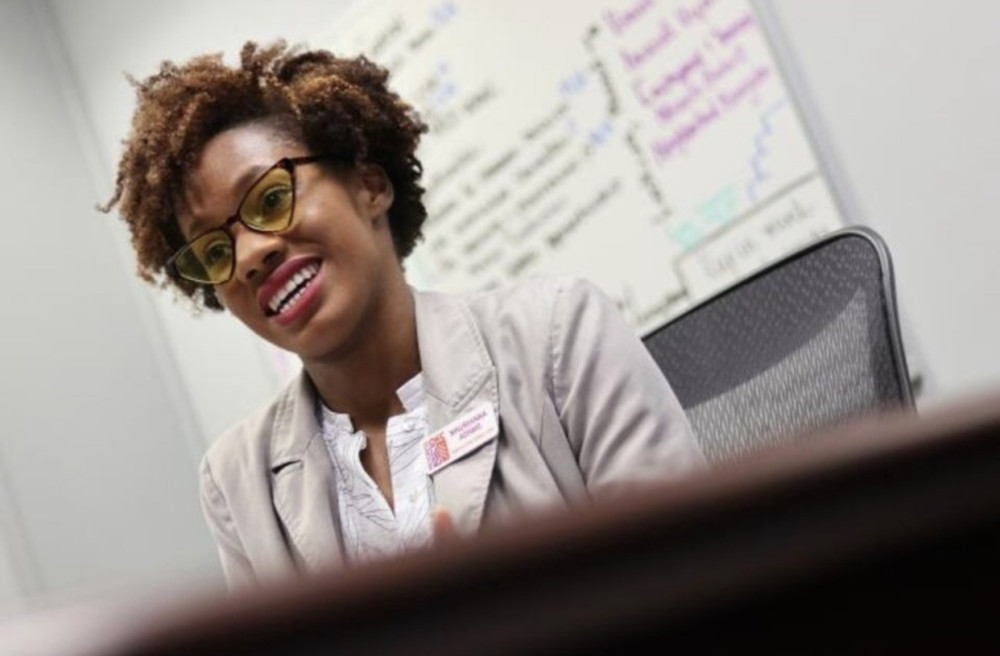By Paula Burkes
The Oklahoman, Oklahoma City
WWR Article Summary (tl;dr) Maurianna Adams is on a mission to change lives. Her work is focused on creating affordable homeownership and developing career pathways for all citizens.
Oklahoma City
Maurianna Adams, the new director of Progress Oklahoma City community development corporation, envisions an Oklahoma City where one’s ZIP code won’t be the strongest predictor of his or her life chances.
Today, residents of northeast Oklahoma City and other communities experience significant disinvestment, Adams said.
In fact, one in four central Oklahomans — including children and adults — live in poverty, even though most families are dual-income, she said.
“We can’t afford to operate in silos anymore,” said Adams, who considers herself a “socialpreneur.” “We have to work together and have a shared vision for long-term collaboration.”
Established as a 501(c)(3) by The Alliance for Economic Development of Oklahoma City in 2015, Progress OKC collaborates with the city of Oklahoma City, nonprofits, neighborhood associations and redevelopment programs to catalyze housing, employment and other initiatives to improve neighborhood conditions.
From her first-floor offices in the Hightower Building at 105 N Hudson, Adams sat down with The Oklahoman on Monday to talk about her life and career. This is an edited transcript:
In what ZIP code did you live as a child?
A: My parents divorced when I was young, and I grew up bouncing between the homes of my maternal and paternal grandfathers on the west and northeast sides of Oklahoma City, ZIP codes 73127 and 73104. I graduated from Putnam City West High School, where African American and Hispanic students were the majority. I remember feeling my school was impoverished. Our high school textbooks and other information were outdated. I took AP (advanced placement) courses and concurrent classes at OSU-OKC. My mom struggled with substance abuse and mental health disorders. She’s more stable today, and I have a 3-year-old half-brother. My dad has a small business and works in transportation and real estate.
Who were your mentors growing up?
A: My maternal grandfather and a good friend of his. I remember going with my grandfather to the Jesus House, where we helped the homeless and displaced. He later went back to school to become a middle school teacher. Meanwhile, I spent two summers in middle school in the Yukon home of a good female friend of his, who’s white and today works as a nurse in Texas. “Miki” and her older son wrapped me in love. Among other things, we played games, and I learned to bake and grow a garden.
What was your first job?
A: City Bites. I was 15 and walked from the apartment I shared with my mom. That job allowed me to help her with expenses and also save up to buy, at 17 or 18, my first car: an old Honda I took to college. At OU, I worked at a call center on campus, for a retail store and as a suite hostess during the football games, which was fun. My last year, I worked as an administrative assistant for Sunbeam Family Services and, following graduation, as a housing case manager for Neighborhood Services Organization.
Before joining Progress OKC in July, you worked as a public health advocate. What were the highlights of that work?
A: Most recently, I worked as an education and outreach director for the Tulsa-based Take Control Initiative in Tulsa, which partnered with social service agencies, health care institutions and community groups to provide education and training including empowering uninsured and underinsured women and families with the choice of when to have children. For the state, I worked as an adolescent health consultant on teen pregnancy prevention and provided support, guidance, and consultation in various areas of adolescent health.
What’s the focus of your work with Progress OKC?
A: Creating affordable, quality home ownership; developing career pathways to secure employment with family-sustaining wages; and fostering economic opportunities. For improving neighborhoods, we see home ownership as a critical tool with long-term intergenerational benefits. Studies show Oklahoma County by 2020 will need 2,165 affordable new homes for individuals making $28,500 or less (median household income is $47,500). With partners, we’ve recently sold four homes near F.D. Moon Middle School and are building five more. Meanwhile, there are hundreds of job openings in the Innovation District today that don’t require four-year degrees and pay $16 an hour and up. We’re making intentional efforts to connect and train residents of surrounding neighborhoods to take advantage of these opportunities in health and research-related fields. Finally, we want to promote banking services as a way to lessen residents’ participation in payday loans and other harmful lending practices that create cycles of debt that can last years. According to the FDIC, nearly 6% of Oklahomans are un-banked, and 25% are under-banked. We also want to support initiatives that strengthen the ecosystem of small businesses in these low-income areas, and leverage opportunity zone incentives for investing them, which in turn will spur job creation, housing stability and more.
PERSONALLY SPEAKING
Position: Progress OKC, executive director.
Website: progressokc.org
Graduated high school from: Putnam City West High School.
Education: University of Central Oklahoma, master’s in public administration; University of Oklahoma, bachelor’s in sociology, and public administration and affairs.
Family: Adryan Adams, personal trainer/gym owner and husband of eight years (she went to high school with his younger brother, who introduced them) and son “A.D.” Adams, 7.
Residence: west Edmond.
Place of worship: The Gate Church in northwest Oklahoma City.
For fun: traveling (San Diego is a favorite), hiking, biking and karaoke.
Trivial fact: She likes wearing non-Rx eyeglasses for style.
___
Distributed by Tribune Content Agency, LLC.














































































































































































































































































































































































